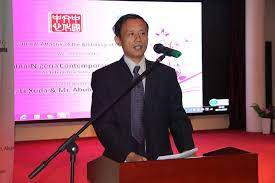Mr Li Xuda, Cultural Counselor, Chinese Embassy in Nigeria has said that China is ready to work with Nigeria to fight against modern-day slavery, a menace a lot of Nigerians have fallen victim to.
Li made the commitment on Monday in Abuja during the commemoration of the 2021 International Day for the Remembrance of Slave Trade and its Abolition.
This year’s commemoration has the theme “Modern Day Slavery, A National Question: Protecting the Future Generation”.
According to the cultural counselor, Modern Day Slavery now comes in the guise of other forms of violence against International laws; like human trafficking, forced labor, adult and child slavery, amongst others.
He noted that statistics have shown the prevalence rate of such practices in Nigeria, hence, the commitment of China to help Nigeria and other UNESCO countries win the fight against Modern-Day Slavery.
“The abolition of slavery is a major advancement in human society. As we are aware, in contemporary times, new forms of slavery have emerged, especially the modern-day subtle, concealed, and undefended forms of slavery.
“For example, today, child and adult slavery and forced labor are illegal in almost all countries, as well as being against international laws.
“But human trafficking for labor and for sex bondage continues to affect tens of millions of adults and children.
“So it is time for us to join hands and seek solutions for their elimination.
“China is ready to work with Nigeria to fight against Modern Day Slavery and create a better future for our next generation,” Li said.
Dr Ifeoma Anyanwutaku, Permanent Secretary, Federal Ministry of Information and Culture said that the annual celebrations were aimed at intensifying awareness campaigns on the dangers of modern-day slavery.
While listing the types of modern-day slavery, Anyanwutaku said the campaigns were designed to enlighten Nigerians on the tricks of traffickers and share experiences of survivors to prevent others from falling as victims.
“As a mother, this year’s theme is particularly a subject of interest to me, considering the realities of modern-day slavery that our children are faced with today.
“Some of which include; human trafficking, voluntary slavery, child labor, forced marriage, forced labor, irregular migration, and so on.
“I believe some of the victims of trafficking will be sharing their first-hand experiences today.
“Against this backdrop, it is my sincere hope that the campaign against modern-day slavery does not end here today.
“I wish to urge media organisations to ensure that the message is sustained on-air and it reaches the nooks and crannies of Nigeria so as to create the needed national awareness of this menace,” Anyanwutaku said.
While sharing his experiences and ordeal, Mr Jeremiah Aduele, a returnee from Libya and survivor of trafficking advised Nigerians, especially youths, to be wary of the traffickers and the different tricks they use to lure unsuspecting victims abroad.
Aduele who is also a graduate urged Nigerians to be focused on building themselves in Nigeria and whenever they want to migrate, they should do so in the right and regular.
“I graduated from Federal Polytechnic, Bauchi in 2014 and was managing a laundry business where a customer tricked me to go to Italy with just paying 300,000, assuring that I will make more money doing the same business in Italy.
“He told me not to tell any member of my family of the trip until I got to Italy. And that is what I want Nigerians to learn.
“Whenever someone tells you not to inform any members of your family of an intending trip, that is the language of traffickers, beware.
“Leaving Nigeria through Sokoto, we transited through Niger to Agades and at some point, we got stuck in the Sahara desert.
“We kept paying money at every transit point and were seriously humiliated, drinking our own urine to survive.
“I am sharing my experience so that others should be wary of the tricks in other not to fall victims”, Aduele said.
NAN also reports that the commemoration was organized by the Federal Ministry of Information and Culture, the United Nations Economic and Social Council (UNESCO), and other parastatals.








